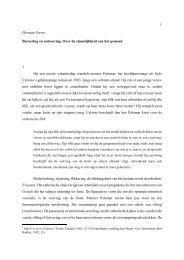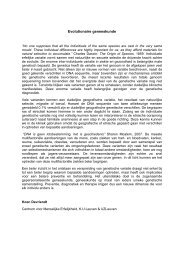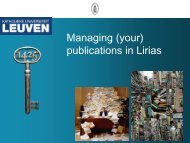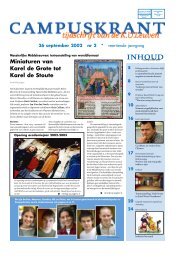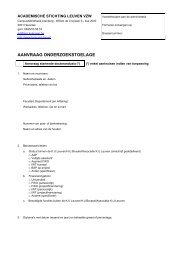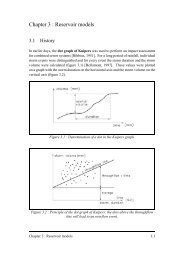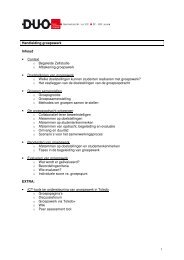EQUALITY GUIdE - KU Leuven
EQUALITY GUIdE - KU Leuven
EQUALITY GUIdE - KU Leuven
You also want an ePaper? Increase the reach of your titles
YUMPU automatically turns print PDFs into web optimized ePapers that Google loves.
Chapter 4 ! Scientific communication 207<br />
4.1.2.1.2. How are people appointed?<br />
You become an assistant because of your results and because you are noticed by one<br />
of the professors. You become a lecturer by applying. When a position becomes available,<br />
it is published, both nationally and internationally, in order to attract the best<br />
candidates. However, during this procedure, many other things may happen ...<br />
At the university, people are appointed by a selection commission, which works formally<br />
as well as informally. The formal part consists of a jury, a test procedure, etc. It<br />
all seems transparent and objective but this is just the visible tip of the iceberg. What<br />
happens behind the scenes is even more important. How did the profile come about?<br />
Who positioned himself/herself and how? Who is part of the commission and who is<br />
not?<br />
A second selection process is far less transparent but at least as important for selecting<br />
the candidate. If the members of the jury know the applicant and have a positive<br />
image of that person, it raises his or her chances of getting the position. The decision is<br />
then often justified by adapting it to the criteria.<br />
It is therefore important not to spend all your time on the preparation of your application.<br />
Go out, do some research, try to find out in advance how the commission is composed,<br />
how the members of the jury will proceed, how you perceive the jury, etc. Their<br />
perception can be coloured by the quality of your work, your character, your reputation<br />
and your motivation.<br />
Tip<br />
If eventually you are not selected, try to find out why. If you have this information, you can use<br />
it for the future. However, retrieving this information should be done in a positive manner.<br />
Example: ‘I am not after your personal opinion but can you tell me something about the tenor<br />
of the evaluation? What can I learn from this application round? Can you give me any tips?’<br />
Do not ask these questions if you are still emotional or angry. If you cannot find the reasons,<br />
try involving someone who can figure it out for you.<br />
4.1.2.1.3. How to work pro-actively?<br />
Women often think they will climb the ladder on the basis of their merits. To achieve<br />
something however, you need to have the support of others as a lever. For this reason,<br />
you have to persuade the commission members of your value for a group. Being selected<br />
is often a matter of how well a person ‘fits’ in the group. Can he/she function in<br />
the whole group and what is his/her added value?<br />
Women frequently think they give clear hints to their superiors but you cannot be clear<br />
enough about your career. Your interest for your work and your profession has to be<br />
dominant. Determine your added value. You can list the steps that you can take in<br />
your career plan. You have to know what the different scenarios are. As a negotiator,<br />
you are strong if you are not in a dependent position. If you can draw several scenarios,<br />
you must dare to convert them to practice as well.



